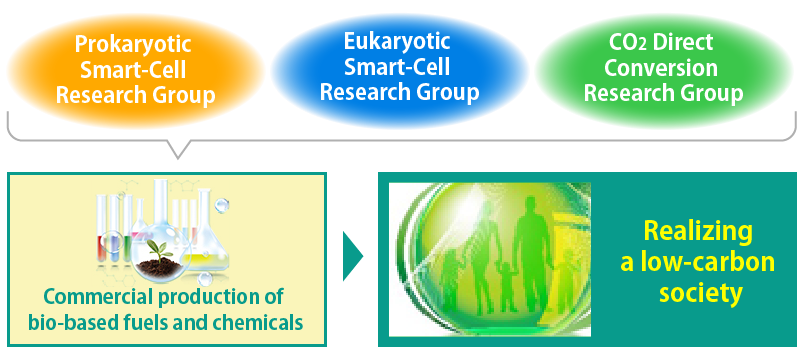Bio-based Fuel and Chemical Research Unit
Objectives

Development of Smart Cells and Other Foundational Technologies for Realizing a Low-Carbon Society
This research unit is involved in a variety of advancements regarding the production of bio-based fuels and chemicals with the ultimate goal of realizing a sustainable low-carbon society. It also works on producing biologically active functional substances.
In Japan, efforts are underway to create a “smart-cell industry”. This is a next-generation industry based on “smart cells”, which are defined as “finely designed, expression-controlled biologically functional cells.” This research unit consists of three research groups, which attend to their work, day in and day out, in a bid to bring about through their research the breakthroughs needed for the society-wide implementation of innovative technologies.

Research Groups
Prokaryotic Smart-Cell Research Group
This research group is developing cells that produce bio-based fuels and chemicals and functional substances using prokaryotes, such as Escherichia coli, Bacillus subtilis, lactic acid bacteria, actinomycetes, and Corynebacterium as a host organism.
To this end, this research group designs smart cells by selecting target products that can make the most of characteristics of a host, designing metabolic pathways, selecting enzymes, and designing genes. It also constructs engineered cells based on the design, evaluates the cells using a high-throughput and an omics-based analysis technique, and learns about metabolic rules from the data by using computational science techniques, progressing the development of smart cells.
Members
KONDO Akihiko (Professor), HASUNUMA Tomohisa (Professor), YOSHIDA Ken-ichi (Professor), IMAISHI Hiromasa (Professor), TAKENAKA Shinji (Professor), TAGUCHI Seiichi (Professor), YASUEDA Hisashi (Professor), ISHII Jun (Associate Professor), ISHIKAWA Shu (Associate Professor), TANAKA Tsutomu (Associate Professor), HIDESE Ryota (Associate Professor), MOCHIZUKI Tomohiro (Associate Professor), and SHINTANI Tomoya(Assistant Professor)
Eukaryotic Smart-Cell Research Group
This research group is developing cells that produce bio-based fuels and chemicals and functional substances using eukaryotes, such as budding yeast, fission yeast, methylotrophic yeast, and other nonconventional yeasts, in addition to filamentous fungi, plant cells, and animal cells as a host organism.
Containing organelles (subcellular organs), eukaryotes exhibit complicated gene expression and metabolic control systems. As such, they require different approaches from those used with prokaryotes. This research group works on establishing the technology for creating smart cells specifically using eukaryotes. Also under development are cells that utilize the characteristics of eukaryotes to produce target substances that are only possible to generate with such cells (i.e., secondary metabolites, peptides, etc.).
Members
KONDO Akihiko (Professor), HASUNUMA Tomohisa (Professor), ISHII Jun (Associate Professor), TANAKA Tsutomu (Associate Professor), ITO Yoichiro (Associate Professor), UMEBAYASHI Kyohei(Associate Professor), BAMBA Takahiro(Assistant Professor), KURODA Shuji (Research Associate), HIRAYAMA Hidenobu (Research Associate), and HORI Yoshimi (Research Associate)
CO2 Direct Conversion Research Group
This research group is working on the production of bio-based fuels and chemicals and functional substances using photosynthetic organisms, such as cyanobacteria, photosynthetic bacteria, microalgae (green algae, diatoms, haptophytes, Euglena, etc.), and cultured plant cells.
It is also working to develop technology for enhancing carbon dioxide fixation ability, as well as metabolic engineering for altering metabolic pathways in such cells, in an effort to establish smart-cell creation technology that will directly lower carbon emissions.
Members
HASUNUMA Tomohisa (Professor), HIDESE Ryota (Associate Professor), and KATO Yuichi(Assistant Professor)
